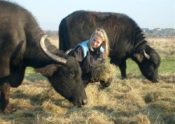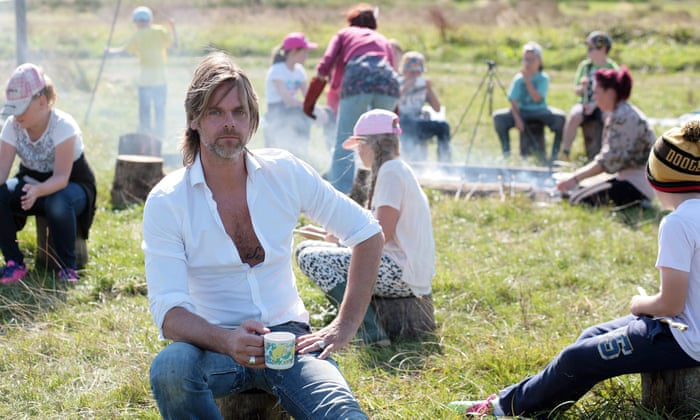Waldorf News
School with guns, knives and fire on the timetable – and Ofsted loves it

Should schools be more willing to embrace danger to give students confidence? One headteacher explains why he thinks so
By Liz Lightfoot
Don’t worry, it’s not dangerous,” says Thomas, 10, carefully positioning a tray of bread cakes over burning coals. “It’s OK if you do it right. There are people here who know the safety rules and they teach us,” he adds.
Children at this state junior school have lessons in using sharp knives, saws and even air rifles. They get to cook food and smelt metal over an open fire and to skin and bone rabbits. Mike Fairclough, their headteacher, believes exposing children to risk fosters a confidence that improves their educational performance, behaviour and attitudes.
Fairclough has no truck with the “elf and safety” brigade and he arrives, lurching alarmingly on the rough terrain, on a quad bike. “A lot of teachers agree with me. Headteachers and governors are more reticent due to their accountability should things go wrong,” he says. “I feel strongly that we should not be limiting ourselves or the children through fear. The reality is that headteachers are much freer than they often believe they are.”
He thinks schools – and parents – are failing children by protecting them from anything that might cause harm instead of teaching them how to handle danger. His decision to take pupils clay-pigeon shooting brought him notoriety – and plaudits from Ofsted and the Health and Safety Executive.

Headteacher Mike Fairclough thinks schools – and parents – are failing children by over-protecting them instead of teaching them how to handle danger. Photograph: Martin Godwin for the Guardian
Now Fairclough has written a book provocatively titled: Playing with Fire: Embracing Risk and Danger in Schools.In it he describes how his school, West Rise Junior in Eastbourne, East Sussex, rents 120 acres of marshland to keep a herd of water buffalo, beehives, chickens, sheep and goats, and gets children out in all weathers to “build grit and resilience”. He invites other schools to “tear off the cotton wool from around our kids and cast it into the flames”.
He wants to counter the “widespread misconception” that health and safety rules prohibit any activity with a potential for danger. He says the subject is shrouded in myths, such as bans on conkers or snowballs “for safety reasons”.
“The reality is that every school can take risks and engage in ‘dangerous’ activities, in the same way that I have done so at my school for years. No one is stopping them. The government, Ofsted and the Health and Safety Executive would all love to see schools embracing danger in a responsible way,” he says.
Fairclough, son of the late actor Gordon Fairclough, is a fine art graduate. He taught in Wood Green, London, Slough and Aylesbury before arriving at West Rise, a 274-pupil school serving two estates where two-thirds of children are eligible for free school meals. He caused a stir when he turned up for the job interview 12 years ago in a vintage pinstripe suit and silver shoes. Today his white shirt is unbuttoned to reveal a glimpse of chest art.

“I took one look at him and thought, not a chance,” says Alex Richards, then a parent governor and now the school’s farm manager. “Silver shoes? What a nutter. I asked where he came from and he said Aylesbury. I said if you think kids come skipping into school here like they do in posh Aylesbury, think again.” Sue Poore, the school’s business manager, admits that Fairclough had looked “distinctive”. “Despite being patently unprepared, he spoke with passion about his aspirations and it came straight from the heart, not a laptop.”
It was the right decision, says Richards: “Mike has transformed the school. We’re in the top 5% nationally for attainment in the Sats and the top school in Eastbourne for reading, writing, maths, punctuation and grammar. He’s getting that hit by having the children challenging themselves and finding solutions together rather than spending all the time facing walls in the classroom.”

The school is on land once occupied by the second largest bronze age settlement in Europe and the children are preparing and cooking food in the way their prehistoric ancestors are thought to have done. Fairclough tastes the flatbread they’ve made, out of flour, honey and milk, spread with butter beaten from cream, and compote from brambles they had foraged. “They are so good, they just get you totally in the groove,” says Fairclough, who describes himself as a hippy and talks about being “loved up”, “totally cool” and “in the vibe”.
That’s just one side of him. The other is an insistence on good behaviour and manners based on mutual respect, a trait he attributes to his “strict but loving” upbringing. He wants West Rise pupils to leave the school as “well-rounded people who don’t wimp out” but who are also proficient in reading, writing and maths. He is keen on art and creative writing but also provides extra tuition sessions to make sure year 6 pupils do well in their Sats.
Fairclough is also, surprisingly, a fan of video games after watching his teenage sons play them online with people from all over the world. “Like health and safety, I believe that video gaming is misrepresented and not understood deeply enough in the teaching profession. In terms of risk and danger, video games offer a broad spectrum of subject matter which will engage most children,” he says.
It’s not only schools that are letting down children but parents too, he believes, when they foist their own anxieties on their offspring. He identifies a growing trend for parents to seek labels, such as ADHD, to explain poor or disturbed behaviour rather than tackling it: “They see something on television about a new disorder, fill in an internet questionnaire and hey presto, the child has a label. Of course there are children with special needs, but in many cases it’s just a result of poor parenting.”

Marmite the micro-pig
Russell Hobby, the general secretary of the National Association of Head Teachers agrees children should learn to handle risk, though he says it is a matter for judgment. “There are obvious risks in allowing opportunities for reckless behaviour and there are more subtle risks in limiting opportunities for adventure and challenge. School leaders steer a difficult course between the two and, inevitably, people will find fault from one direction or another. If we trusted school leaders more and threatened them less, they would be able to exercise this judgment more confidently,” he says.
Dame Judith Hackitt, the former chairwoman of the Health and Safety Executive, visited West Rise to see for herself: “Once in a while you encounter someone who inspires you. Hearing about and then meeting Mike Fairclough was one such encounter for me. I spent most of my tenure encouraging teachers and parents to recognise their role in helping children to learn about risk to prepare them for life. Here is someone who does exactly that and much, much more,” she says.
Of course, not every state school can rent swaths of marshland, but Fairclough thinks they can all find ways to challenge children. “If you follow your heart and do what you love, while also being strategic with Ofsted and the requirements of the government, then teachers are able to do whatever they like, provided it has a measurable and positive educational impact on the children,” he says.
He admits that some parents worry at first but says they are reassured by the careful risk assessments drawn up for each activity and their children’s clear enthusiasm. “It’s the best part of school. I love it more than anything,” says Thomas. It’s not just a boy thing: “It’s good to come out into the fresh air with your friends and try new things,” says Georgia, 11. Their favourite activity is making food and cooking on an open fire. “And the really good thing is you get to eat it,” says Dominic, 10.

The marsh
Mike Fairclough is the author of “Playing With Fire” Embracing Risk and Danger in Schools. Mike’s books explore themes inspired by his experiences as the Headteacher of the Internationally acclaimed West Rise Junior School. Mike runs a farm attached to the school and manages over 120 acres of marshland, on which the children and staff are building a Bronze Age replica village. He has a herd of Asian water buffalo, which the children look after and several hives of honey bees. Mike also teaches his pupils countryside management skills, such as using shotguns and fishing. This subject matter provides rich and entertaining material for Mike’s books. His school became the Times Educational Supplement School of the Year in 2015 and has been widely celebrated in the Media and in numerous publications.
Order a copy of Playing with Fire: Embracing risk and danger in schools here.
This article is from theguardian.com.

The school with a herd of water buffalo

Photos from West Rise Junior School
 Training in Traumatology & Artistic Therapies
Training in Traumatology & Artistic Therapies Association for a Healing Education
Association for a Healing Education Waldorf Training in Australia
Waldorf Training in Australia Caring for All Stages of Life
Caring for All Stages of Life Full-Time Teacher Education
Full-Time Teacher Education Jamie York Books, Resources, Workshops
Jamie York Books, Resources, Workshops ~ Ensoul Your World With Color ~
~ Ensoul Your World With Color ~ Bay Area Teacher Training
Bay Area Teacher Training Preparing Teachers for 2024-25 Grades 1-8
Preparing Teachers for 2024-25 Grades 1-8 Waldorf Stories for Everyone
Waldorf Stories for Everyone Quality Education in the Heartland
Quality Education in the Heartland Immersive Academics and Arts
Immersive Academics and Arts Grade Level Training in Southern California
Grade Level Training in Southern California Transforming Voices Worldwide
Transforming Voices Worldwide Bringing Love to Learning for a Lifetime
Bringing Love to Learning for a Lifetime Summer Programs - Culminating Class Trips
Summer Programs - Culminating Class Trips Train to Teach in Seattle
Train to Teach in Seattle Great books for Waldorf Teachers & Families
Great books for Waldorf Teachers & Families Grade-specific web courses for teachers
Grade-specific web courses for teachers Flexible preparation for your new grade
Flexible preparation for your new grade Roadmap to Literacy Books & Courses
Roadmap to Literacy Books & Courses Space speaks. Its language is movement.
Space speaks. Its language is movement. Everything a Teacher Needs
Everything a Teacher Needs Middle School Science With Roberto Trostli
Middle School Science With Roberto Trostli Waldorf-inspired Homeschool Curriculum
Waldorf-inspired Homeschool Curriculum The Journey is Everything
The Journey is Everything RSS Feeds
RSS Feeds